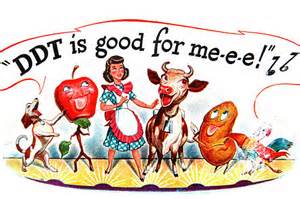Front groups have been hitting environmental and food-conscious moms, activists, and every day people hard – stooping lower than you could imagine.
“As crude a weapon as the cave man’s club, the chemical barrage has been hurled against the fabric of life – a fabric on the one hand delicate and destructible, on the other miraculously tough and resilient, and capable of striking back in unexpected ways. These extraordinary capacities of life have been ignored by the practitioners of chemical control who have brought to their task no “high-minded orientation,” no humility before the vast forces with which they tamper.” Rachel Carson, Silent Spring
More than 50 years have passed since the catchy slogan, “DDT is good for me,” ran on full-page ads in women’s magazines. The illustration featured a s miling housewife wearing a frilly red-and-white apron and singing in a giddy chorus line with her dancing dairy cow and family dog. It seems laughable now. But it’s more than a bit unsettling to talk to people with childhood memories of running through plumes of DDT sprayed by fog trucks roaming suburban neighborhoods and decimating bird populations, before that synthetic compound was banned in 1972.
miling housewife wearing a frilly red-and-white apron and singing in a giddy chorus line with her dancing dairy cow and family dog. It seems laughable now. But it’s more than a bit unsettling to talk to people with childhood memories of running through plumes of DDT sprayed by fog trucks roaming suburban neighborhoods and decimating bird populations, before that synthetic compound was banned in 1972.
Today, the suburban neighborhood has been replaced by the virtual worlds of the internet and social media, but there’s still plenty of toxic spray in the air. The vehicles aren’t trucks, but websites that fog us with lies the chemical and meat industries propagate. The spin is new and more sophisticated, but the goal is the same: to push an agenda that puts profits ahead of health and the environment. Who is under attack? Vegans, for sure, and also those legions of “crazed” mommies who buy organic food. Some of the most vicious attacks are being directed at animal welfare groups.
Here’s a condensed version of the current crop of corporate-backed messages popping up on websites, in ghost-written editorials and in news articles:
- Organic food moms are elitist food nannies
- Vegans and animal rights groups are the enemy
- Organic foods are a scam
- Food industry regulations are an assault on consumer freedom
- Antibiotics and hormones are just fine
- GMOs will feed the world and reduce pesticide use
- Anyone who disagrees with these talking points is a misinformed reactionary
Unveiling the Villains
These corporate mantras and the tactics used to sell them are exposed in a new, in-depth report, Spinning Foods: How Food Industry Front Groups and Covert Communications are Shaping the Story of Food published by Friends of the Earth, a non profit that works to foster policies and practices that protect the environment. The report names organizations that front for powerful interests with ties to the chemical, meat, tobacco, and oil industries.
They include groups such as the Independent Women’s Forum, which is anti-feminist and backed by the Koch brothers and right-wing foundations, according to Source Watch, an non profit that tracks corporations for the Center for Media and Democracy.
For instance, Julie Gunlock , a senior fellow and the director of the Culture of Alarmism Project at the Independent Women’s Forum has stated publicly that she doesn’t understand why Monsanto is hated and describes them as ‘a company that has done quite a lot for farmers around the world.”
Another active front group with an innocuous name, Protect the Harvest, has declared war on the Humane Society of the United States, while the Center for Consumer Freedom goes after anyone who treads on the toes of the tobacco and alcohol industries. Source Watch has identified all three as front groups. Protect the Harvest has devoted endless cyber ink to savaging the Humane Society of the United States HSUS and its crusading president, Wayne Pacelle. HSUS has been labeled as the “most dangerous animal rights organization in America” by the people at Protect the Harvest.
According to a long diatribe on the site, Pacelle is a “coolly composed extremist” whose suspicious background includes veganism and arguments against animals being treated as property. Here is a sample: “Wayne Pacelle converted to veganism by the age of 19, having a brief one month stint as a vegetarian and no prior non-meat diet experience.”
Where Do These Organizations Come From?
Protect the Harvest’s mission statement declares that their organization was “created to fight back and defend American families, farmers, and sportsmen from the growing threat posed by the animal rights movement.” Who is the driving force behind Protect the Harvest? That would be Forrest Lucas of Lucas Oil Products and Lucas Cattle Company. Lucas backs an agenda that includes the support of horse slaughter and an attempt to kill a Missouri law, which sets standards for the proper care of dogs in puppy mills.
HSUS has done its best to debunk the vicious attacks against its ongoing efforts to safeguard pets, wildlife and farm animals. Here is what HSUS has to say about this Lucas-sponsored front group. “Protect the Harvest apparently means protecting puppy mills, factory farms, and cruelty to companion animals.”
Just How Low Can They Go?
Insulting rhetoric is by no means out of bounds. Animal advocate and environmentalists are derided as ‘obsessed’ or ‘hysterical’ and their fact-based claims branded as ‘fiction.’ When Rachel Carson published Silent Spring in 1962, the National Agricultural Chemicals Association went into attack mode, calling her a “communist” and threatening to sue her publisher. Things haven’t changed much since then, except that the tactics have become more sophisticated.
As Laura Orlando points out in a lucid article, Industry Attacks on Dissent on the Dollars and Sense website,“Not only has the production of chemical poisons continued, but the chemical industry has become much more skillful at manipulating the media for its own ends. Now we are fed big pills of outright lies, prevarication, and deception.”
Editor’s note: For instance read this story about a chemical apologist defending systemic pesticides.
The Koch brothers are apparently worried that too many Americans want to know how their food is being grown and produced.
“Parents are bombarded with alarmist messages on a daily basis about how the food they eat, the habits they practice, and the household products they use threaten their health and the health of their children,”says Gunlock. “Rather than make women feel more informed, the onslaught of alarmist information makes moms (and dads) feel guilty, confused, even angry.”
On his website Counter Punch, Karl Grossman, professor of journalism at the State University of New York, explains that these and other pronouncements are meant to counteract the work done by The Mothers Project, a grassroots organization based in New York that empowers women to be informed about issues ranging from farming to fracking.
The Spinning Foods report analyzes the tactics being used by corporations, including the avoidance of words such as ‘antibiotics’ and ‘hormones’ in favor of phrases like ‘keeping animals healthy’ and ‘maintaining growth.” The first two are “Words to Lose” and the second “Words to Use,” according to advice given as part of the official communications strategy of the US Farmers and Ranchers Alliance.
(Gunlock has foolishly defended antibiotics by stating that animals need medicine too. Even though antibiotics were never meant to be used preventatively. )

Latest Attacks
What’s the latest on the campaign to crush dissent on GMOs? Here is an excerpt from the Spinning Foods report: “From Monsanto’s website to the op-ed pages of the biggest media outlets, the biotech industry promotes the message that GMOs are essential to feeding the world’s growing population, largely based on the claim that biotech crops increase yields and use fewer resources. The Reality: Since their first commercialization in 1994, genetically engineered traits have largely been introduced into commodities like corn, soy, and cotton that are mostly grown for animal feed, biofuels or fiber. These crops are not being grown to feed people directly, or at all.”
The report also addresses the ongoing attacks on mothers concerned about pesticide use. The agribusiness industry “actively works to undermine the sway of women who are organic food advocates, precisely because evidence shows just how much impact these voices can have.” It goes on to cite a 2014 New York Post story, The Tyranny of Organic Mommy Mafia, that describes the “arrogance and class snobbery” of moms who buy organic produce and food. The article quotes Gunlock, who labels these mothers as “crazed.” The report notes that Gunlock’s group actively opposes climate science education in schools and has claimed that the evidence on man-made global warming is “junk science.”
Spreading vitriol on social media is also being used to go after dissenters. For example, a Twitter attack on Dr. Mehmet Oz, a vocal proponent of GMO labeling, prompted a Washington Post story with the headline, Dr. Oz solicits health questions on Twitter, gets attacked by trolls instead. The story describes critics “hammering Oz with a stream of sarcastic questions and attacks on his credibility as a physician.” Several Twitter users mentioned in the story are among the most prolific online defenders of GMOs, according to the Friends of the Earth report.
Bullying at Its Best
Going after the credibility of independent scientists is an all too common tactic. Scientists who have raised concerns about chemical agriculture have regularly found themselves targeted and harassed. One chemical company’s campaign to take down a scientist who had done important work exposing the dangers of the herbicide atrazine is documented in an in-depth expose published in the New Yorker and written by Rachel Aviv.
In the article, A Valuable Reputation, Aviv describes the secret campaign against UC Berkeley scientist Tyrone Hayes by chemical giant Syngenta after Hayes’s research revealed atrazine’s harmful effects on the sexual development of frogs. Aviv shows how Syngenta’s nasty tactics were exposed in internal emails and memos that resulted from two class action lawsuits against Syngenta filed by Midwestern cities in regards to damages caused by contamination of their municipal drinking water.
A spiral-bound, dirty tricks notebook kept by the company’s communications manager came up with ideas for undermining Hayes, including discrediting his work and linking him to a scandal. One of the notes suggested actions to be taken, such as “investigate funding” and “investigate wife.”
When Carson’s ground-breaking book was published, she was battling the cancer that claimed her life in 1964. That didn’t stop critics from using her as a punching bag. She was derided as a ‘spinster’ who had no business worrying about genetics. One condescending government critic accused her of being a member of a large “misinformed citizenry” that remained stubbornly resistant to accepting “the important place of agriculture chemicals in our economy.” Five decades later, this misinformed citizenry has grown into a unstoppable movement, thanks to Carson and her pioneering work.
 Samme Chittumis an award-winning writer who uses the power of narrative to enlighten and effect change. Her work has been published by leading national and international news outlets, including the New York Times. She specializes in writing about health, women’s issues and the environment. As an editor for the Women’s Feature Service, she directed on-site coverage for the 1993 United Nations Conference on Human Rights in Vienna, Austria and the 1995 World Conference on Women in Beijing, China.
Samme Chittumis an award-winning writer who uses the power of narrative to enlighten and effect change. Her work has been published by leading national and international news outlets, including the New York Times. She specializes in writing about health, women’s issues and the environment. As an editor for the Women’s Feature Service, she directed on-site coverage for the 1993 United Nations Conference on Human Rights in Vienna, Austria and the 1995 World Conference on Women in Beijing, China.
Submit your story or essay to Buzzworthy Blogs.




2 thoughts on “Spinning Food: Front Groups on the Attack”
Your reporting is superb, Samme Chittum. This story should cause anyone who wonders why there’s so much cancer, obesity and other draconian illnesses to think again. You’ve shed invaluable light on why it’s so hard for scientists and journalists to get information out to people – or even to raise questions.
Thanks for bringing this to our attention Ms. Chittum! This is certainly something which troubles me and the more that it’s widely reported the less we can be deceived, lied to and attacked by these noxious groups.
Comments are closed.